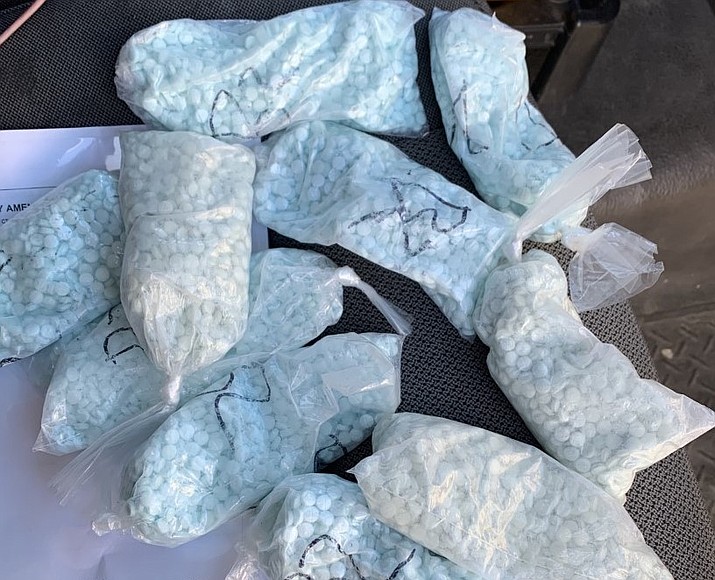DEA singles out Yavapai County as hotspot for opioid initiative
Local law enforcement responds, says actions have been taken to mitigate issue
Without consulting any Yavapai County leaders, the Drug Enforcement Administration (DEA) announced in a news release last week that Yavapai County will seemingly be at the forefront of a newly launched comprehensive law enforcement and prevention initiative aimed at reducing drug use, abuse, and overdose deaths throughout Arizona.
This initiative was named “Operation Engage” and it allows participating field divisions to focus on the biggest drug threat and resulting violence in their respective geographic areas. The Phoenix Field Division submitted one of the 11 proposals approved in the initial round of funding and will focus its Operation Engage efforts on Yavapai County.
“For too long, opioids have ravaged the communities of Prescott, Cottonwood, and Chino Valley and surrounding communities in Yavapai County. The opioid epidemic will continue to grow and worsen if nothing is done,” said Cheri Oz, special agent in charge of DEA in Arizona. “Today, I am happy to announce ‘Operation Engage’ which will bring together many Yavapai County agencies and community groups in our unified fight against opioids and opioid-related deaths. By connecting and unifying our efforts, we will save lives.”
While this initiative should help with mitigating the severity of the opioid crisis, local law enforcement, especially the Yavapai County Sheriff’s Office (YCSO), were caught off guard by the DEA’s news release and were basically displeased they were left out of the equation. YCSO, the County Attorney’s Office, as well as Prescott, Prescott Valley and Chino Valley police departments each stated that they were never contacted by the DEA to discuss matters relating to this issue.
To note, overdose deaths across the country involving methamphetamine increased almost 35% in the past year and now exceed the number of cocaine-involved overdose deaths, which increased by 26.5%, according to the news release. Yavapai County, in particular, had an opioid-related death rate of 11.79 per 100,000 in 2018, which made it the fourth-highest county in the state, according to the Arizona Department of Health Services.
YCSO RESPONSE
The DEA’s announcement prompted YCSO to respond by putting out a news release of its own on Monday, March 1.
“It is disappointing that the DEA would release this news without making any effort to contact the Yavapai County Sheriff’s Office or any of its community partners within the county,” Sheriff David Rhodes stated. “The DEA singled out Yavapai County as ground zero of the opioid epidemic and suggested that nothing was being done in their statement, which is out of touch with the facts and disheartening to the local partners who know better.”
YCSO has combated the opioid crisis and other drug challenges in the community through broad based coalitions such as Partners Against Narcotics Trafficking (PANT), Yavapai Justice and Mental Health Coalition, and MatForce as well as nationally recognized programs such as Reach Out, Yavapai Reentry, and the Overdose Death Review Task Force.
The Reach Out program, for example, connected 714 inmates to services upon release from jail in 2020, according to the news release. This helped achieve a recidivism rate for those screened, of only 16% in 2020.
The YCSO news release also stated that its K9 unit is consistently seizing pounds of drugs and thousands of fentanyl pills. In 2019 and 2020, PANT detectives and K9 teams seized nearly 15,000 fentanyl pills, 29 grams of fentanyl powder, served 45 search warrants and arrested 129 suspects related to fentanyl possession and sales.
Lastly, the Yavapai Silent Witness program, yavapaisw.com, has been expanded and has been instrumental in the local efforts by allowing concerned community members to report drug activity anonymously.
“The opioid crisis is bad in Yavapai County but it’s bad everywhere and I think that one of the things that Yavapai County has done extremely well is to respond to this by developing our own data about opioid use in Yavapai and about overdoses,” Rhodes told The Daily Courier. “While other areas are in crisis level or even worse than Yavapai County, we’ve got good data showing what the length of our problems are and we’re able to use that information for all the response that we’ve put in place.”
COUNTY ATTORNEY
Yavapai County Attorney Sheila Polk admits that Yavapai County does have an opioid problem but she echoed Rhodes in saying that law enforcement has been on top of it through the aforementioned coalitions, programs and initiatives.
“We were caught by surprise because there was no communication. We didn’t know the DEA was targeting Yavapai County,” Polk told the Courier. “More resources are always welcome and it looks like their initiative involves bringing additional resources. So we’re certainly happy but what concerns me is that there are many areas across Arizona that don’t have the resources and the programs that Yavapai County already has.”
QUAD-CITY POLICE
As expected, all three quad-city police departments, including Prescott, Prescott Valley and Chino Valley, work closely with the YCSO to combat the opioid crisis and other drug-related issues.
“The Prescott Valley Police Department is a proud member of the PANT Task Force in Yavapai County. Our department is currently forming a narcotics squad to address street level narcotics in the Town of Prescott Valley, which will include the continued coordination with all of PANT Task Force members,” PVPD Chief Steven Roser said.
The partnership will include aggressive enforcement against drug dealers within the community and continued partnership with MatForce, a countywide coalition whose mission includes the elimination of substance abuse and its effects, Roser said.
“Our newly formed narcotics squad will be very active within the next few months combating the illicit drugs effecting our community and citizens,” he added.
CVPD Lt. Randy Chapman said Chino Valley doesn’t encounter opioid-related cases as often as other jurisdictions in the area, but they have dealt with some and administered Narcan to several individuals suspected of an opioid overdose over the past few years. The last known overdose death in Chino Valley was over a year ago, he said.
“Our agency has dealt with the opioid issue by educating the community and our officers on opioids. Last school year, we had an assembly at Chino Valley High School to educate the students about the effects of opioids and how easily they can overdose on them. We had several speakers from different organizations present to the students,” Chapman said. “Whenever we have an overdose death or suspected overdose we contact the narcotics task force so they are aware of it. Any issues regarding opioids or fentanyl are brought to their attention.”
Follow Aaron Valdez on Twitter at @Valaaron_94. Email avaldez@prescottaz.com or call 928-445-3333, ext. 2031.
Sign up for our e-News Alerts
SUBMIT FEEDBACK
Click Below to:






